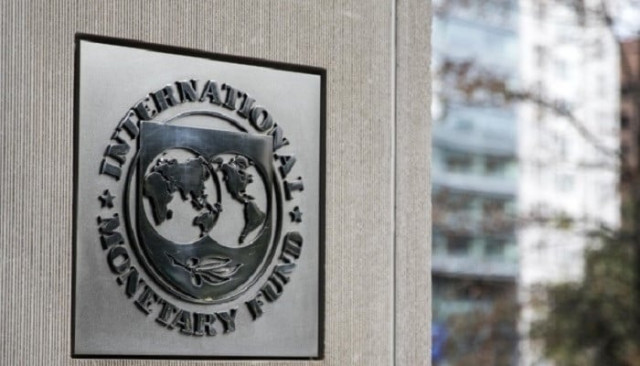IMF approves $1.1b tranche for Pakistan
Ends uncertainty that multiplied in past three years

The Executive Board of the International Monetary Fund (IMF) on Monday revived Pakistan’s bailout programme after a hiatus of six months, approving the $1.1 billion tranche and ending uncertainty that multiplied in past three days due to manoeuvring by the Pakistan Tehreek-e-Insaf (PTI).
The IMF said that Pakistan’s economy will grow to around 3.5% but the average inflation rate is estimated at 19.9% -- the projections that had been made before the floods destroyed vast swathes of the country.
The global lender also approved an increase in the loan size to $6.5 billion and extended its expiry date till June 2023. The $6 billion original programme was going to end next month with half of the amount undisbursed due to failure of the PTI government to fulfil its commitments.
With the augmentation, the programme size has been increased to the SDR4.988 billion, which is equivalent to 245.6 per cent of Pakistan’s quota.
“The board’s decision allows for an immediate disbursement of SDR894 million (about $1.1 billion), bringing total purchases for budget support under the arrangement to $3.9 billion,” according to a statement issued by the IMF after the meeting.
Read: IMF shares LoI with govt to seal loan deal
In its handout, the IMF emphasised the need to increase electricity prices and enhance taxes on petroleum products, as per the schedule agreed between Pakistan and the IMF.
“Efforts to strengthen the viability of the energy sector and reduce unsustainable losses, including by adhering to the scheduled increases in fuel levies and energy tariffs, are also essential,” said IMF Deputy Managing Director Antoinette Sayeh.
She said that containing current spending and mobilising tax revenues are critical to create space for much-needed social protection and strengthen public debt sustainability.
The IMF also stressed that Pakistan should keep following the policy of high interest rates and market-determined exchange rate.
“The tightening of monetary conditions through higher policy rates was a necessary step to contain inflation. Going forward, continued tight monetary policy would help to reduce inflation and address external imbalances,” the deputy managing director said.
She added that maintaining proactive and data-driven monetary policy would support these objectives. Preserving a market-determined exchange rate remained crucial to absorb external shocks, maintain competitiveness, and rebuild international reserve, Antoinette said.
“Accelerating structural reforms to strengthen governance, including that of state-owned enterprises, and improve the business environment would support sustainable growth. Reforms that create a fair-and-level playing field for business, investment, and trade necessary for job creation and the development of a strong private sector are essential.”
Some of the directors of the IMF board expressed concerns over policy slippages and reversal of the commitments that former finance minister Shaukat Tarin had given on behalf of the government of Pakistan, according to the sources.
All executive directors, except India that abstained from the voting, supported Pakistan’s request for the revival of the programme and the loan approval, the sources added.
In February this year, the previous government had assured the IMF board the resolve to stay on course but hardly a month later, the then government laid the landmines by giving subsidies and introducing another tax amnesty scheme, which led to collapse of Pakistan-IMF talks in March.
The board also waived off the conditions that Pakistan could not meet during January-June 2022 period. The PTI had tried to spoil the deal by manoeuvring the governments of Punjab and Khyber-Pakhtunkhwa to backtrack from their commitments to the IMF programme in retaliation to the case against Imran Khan under the Anti-Terrorism Act.
With the fresh approval, the disbursement would increase to $3.9 billion, leaving a balance of $2.6 billion that will be disbursed till June next year. The next IMF review will now take place in November to take stock of the performance of Pakistan’s economy for the July-September 2022 period.
The formal resumption of an IMF programme is a major step forward in our efforts to put Pakistan’s economy back on track. It is the outcome of an excellent team effort, tweeted Prime Minister Shehbaz Sharif. He patted Miftah Ismail and the Ministry of Finance and other stakeholders for pulling the country back from the brink of default.
The PTI had left Pakistan’s economy in tatters, compromised its relations with the international financial institutions and also severed ties with friendly countries and as a result, Pakistan’s financing was almost choked.
Read More: Pakistan awaits relief with bated breath ahead of IMF meeting
The IMF deputy managing director stated that Pakistan was at a challenging economic juncture. “A difficult external environment combined with pro-cyclical domestic policies fuelled domestic demand to unsustainable levels.”
The resultant economic overheating led to large fiscal and external deficits in FY22, contributed to rising inflation, and eroded reserve buffers, she added.
“The programme seeks to address domestic and external imbalances, and ensure fiscal discipline and debt sustainability while protecting social spending, safeguarding monetary and financial stability, and maintaining a market-determined exchange rate and rebuilding external buffers,” the IMF stated.
“Pakistan’s economy has been buffeted by adverse external conditions due to spillovers from the war in Ukraine and domestic challenges, including from accommodative policies that resulted in uneven and unbalanced growth, according to the IMF.
“Steadfast implementation of corrective policies and reforms remain essential to regain macroeconomic stability, address imbalances and lay the foundation for inclusive and sustainable growth.”
However, in yet another turn of the events, the programme’s targets, agreed to in June, had again become irrelevant due to devastating floods that inundated large swathes of Pakistan, requiring major relief and rehabilitation efforts.
As per the commitment, Pakistan was required to show primary budget surplus of Rs153 billion or 0.2% of the GDP but it now seemed impossible to get this target due to huge possible fiscal slippages.
But in its handout, the IMF said that Pakistani “authorities” plan to achieve a small primary surplus in FY 2023 was a welcome step to reduce fiscal and external pressures as well as build confidence. Further efforts to reduce poverty and protect the most vulnerable by enhancing targeted transfers were important, especially in the current high-inflation environment, it added.
The IMF statement was silent on the issue of disaster caused by the floods.
Finance Minister Miftah Ismail said the cost of the relief was estimated at $1 billion while the total damages over $10 billion.
The sources said that the executive directors representing the United Arab Emirates, Saudi Arabia and Qatar also gave assurances to provide additional financing to Pakistan, as agreed between Islamabad and the IMF staff.
The previous PTI government had signed the 39-month Extended Fund Facility (EFF) in July 2019 aimed at avoiding default on foreign repayment obligations. However, the country remained in turmoil and despite remaining in the IMF programme, its foreign exchange reserves remained thin amid heightened external debt-related vulnerabilities.
The reserves stood below $7.8 billion, not enough for the policymakers to relax despite revival of the bailout package.
Due to faulty EFF programme design, unrealistic targets and lack of political commitment to implement what former premier and PTI chief Imran Khan had himself agreed to, the programme remained suspended for almost two years out of three.
Pakistan assured the IMF that it remained committed to resuming reforms and already increased the electricity tariffs and withdrew the fuel subsidies besides restoring taxes.
The Pakistani authorities informed the board members about the monetary tightening by 8% and setting the key policy rate at 15%, which according to them would help ease the inflationary pressure. However, the recent floods had broken the food supply chains, which would result in a significant spike in inflation.
Under the IMF condition to enhance the monetary policy transmission, the rates of the two major refinancing schemes – Export Financing Scheme and Long Term Financing Facility – were increased to 10%.



















COMMENTS
Comments are moderated and generally will be posted if they are on-topic and not abusive.
For more information, please see our Comments FAQ